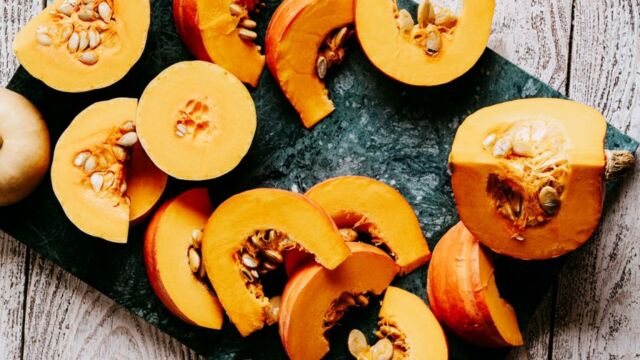Pumpkins aren’t just great Halloween decorations, they’re actually really good for your health—especially if you’re past the age of 50. Here are some reasons why you should start including them in your diet, if you haven’t already.
Discover our latest podcast
Pumpkin is rich in antioxidants
Ysabelle Levasseur, a dietician and nutritionist, says that the fruit is actually filled with a bunch of antioxidants and vitamins that reduce stress. She says:
It contains vitamin A, the precursor of beta-carotene, vitamin E, but also lutein and zeaxanthin, antioxidants that help fight against oxidative stress.
Another advantage of eating a fruit that is rich in vitamin A and beta-carotene, in particular, is that they are quite beneficial when it comes to protecting your vision. She explains that these antioxidants slow down the natural deterioration of the retina, which usually starts around the age of 40. Additionally, the more orange the colour of the pumpkin is, the higher its beta-carotene content is.

Pumpkin is packed with fibre
Fibre is essential for senior citizens as it helps control blood sugar and cholesterol levels. It also regulates the intestinal or bowel transit time and helps combat constipation. Pumpkin contains 0.5 to 2 grams of fibre per 100 grams—so you can get a bunch of benefits by just incorporating this food into your diet. Levasseur adds:
Pumpkin also contains mannitol, a slightly laxative carbohydrate, which makes it possible to recommend its consumption to fight constipation naturally.
Pumpkin is low in calories
Given their high water content, pumpkins (both raw and cooked) are low in calories. 100 grams provides an average of 14 to 32 kcal. This means that you can eat more of it and even feel full, without packing on the pounds. The dietician recommends that:
It should make up at least half of the plate.
This is why pumpkins are great to make soup with—but of course, the calorie count of the dish will depend on other ingredients you incorporate. So you might want to be careful with the amount of cheese, cream, butter and oil you add.

Pumpkin contains an essential vitamin
We’ve already mentioned that pumpkins are rich in vitamins, but it has one particular vitamin that is exceptionally important when it comes to your blood—vitamin B9 or folic acid. Levasseur explains that it is:
Involved in the production of all the body's cells, including red blood cells.
Benefits of the squash family
Naturally, the pumpkin is not the only member of the squash family that has interesting health benefits. It is, however, the squash that contains the most beta-carotene.
If you’re looking for something with a good dose of potassium to regulate blood pressure, then butternut squash should be your go-to choice.

Just keep in mind that if you are including squash in your menu, you should ‘accompany it with a source of fat to promote the absorption of beta-carotene,’ advises Levasseur. To preserve all of its incredible properties, you should avoid cooking it for too long and reheating it multiple times.















